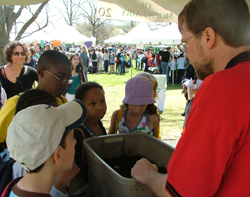| In recent weeks, Temple has shown its commitment to the environment in a number of ways, ranging from providing an outdoor educational celebration of Earth Day to the expansion and refinement of the university’s recycling program and waste minimization efforts, as seen in the RecycleMania competition.
Most recently, on Friday, April 24, more than 12,000 visitors joined Temple University Ambler for one of the largest celebrations of Earth Day on the East Coast. At this year’s EarthFest event, visitors learned from a wide range of exhibitors on topics including the environment, sustainability, healthy lifestyles and protecting and preserving the planet. More than 90 exhibitors took part in this year’s event, including the Academy of Natural Sciences, the Delaware River Basin Commission, the Energy Cooperative, the Franklin Institute, PECO Energy, the Insectarium, the Philadelphia Zoo and others. |
 Photo by James Duffy
Professor Bradley Flamm, assistant professor in the Department of Community and Regional Planning, talks to EarthFest visitors about using worms to compost kitchen scraps at the Worm Breeders of Mount Airy exhibit. This year’s EarthFest featured over 90 exhibitors and brought more than 12,000 visitors to Temple’s Ambler Campus.
|
|
|
|
|
Prior to EarthFest, the final results of the RecycleMania competition were announced. The intercollegiate, national campaign to raise awareness of and participation in college waste reduction programs ended March 28, and Temple collected a total of 349,275 pounds of recyclables between the third and tenth week of the competition. (The first two weeks of the competition are considered trial weeks and are not counted in the final competition results; 426,336 pounds of recyclables were collected throughout the 10-week competition.) Temple was the A-10 waste minimization champion and the runner-up in the Pennsylvania Gorilla Prize category. But, perhaps more important than its final standings in the competition are the effects Temple’s recycling efforts have on the environment. In weeks three through 10 of the competition, Temple’s recycling efforts resulted in the conservation of 1,823 trees and the reduction of greenhouse gas emissions by 170 metric tons of carbon equivalent (the amount of greenhouse gases emitted by 128 cars annually). Senior facilities specialist H. Marshall Budin, who manages the Recycling Office, sees two major improvements in Temple’s approach to RecycleMania this year. “In my opinion, there were two major accomplishments this year,” he said. “First, there was the expansion of RecycleMania under the direction of the Office of Sustainability to include a broader cross section of stakeholders: Student Affairs, Dining Services and others. Second is the refinement of the database to track and analyze solid waste from all sources across campus to give us a baseline to benchmark our waste minimization progress in future years.” Temple’s focus on waste minimization, in addition to recycling, is just one of the ways that the university is working toward carbon neutrality as a signatory of the American College & University Presidents Climate Commitment. “We all win when increased awareness on waste reduction translates to deliberate actions to create a more sustainable campus environment and reduce the pressure on our planet’s resources,” Budin said. |